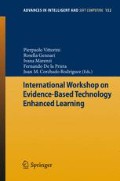Abstract
TERENCE is an FP7 ICT European project that aims at developing an adaptive learning system for supporting learners and educators: the TERENCE learners are 7-8 to 11 year old children with poor reading comprehension skills; the TERENCE educators are primary-school teachers, support teachers and parents. The analyses of the context of use and requirements of the TERENCE system are based on real data. Therefore also the design of the conceptual model of the TERENCE system is based on real data. This paper describes the domain and user model of the TERENCE system, and its evidence-based design process.
Access this chapter
Tax calculation will be finalised at checkout
Purchases are for personal use only
Preview
Unable to display preview. Download preview PDF.
References
Alrifai, M., Gennari, R., Vittorini, P.: Adapting with Evidence: the Adaptive Model and the Stimulation Plan of TERENCE. In: Proc. of eb-TEL 2012. Springer (2012)
Brusilovsky, P.: Adaptive Hypermedia: From Intelligent Tutoring Systems to Web-Based Education. In: Gauthier, G., VanLehn, K., Frasson, C. (eds.) ITS 2000. LNCS, vol. 1839, pp. 1–7. Springer, Heidelberg (2000)
Brusilovsky, P., Millán, E.: User Models for Adaptive Hypermedia and Adaptive Educational Systems. In: Brusilovsky, P., Kobsa, A., Nejdl, W. (eds.) Adaptive Web 2007. LNCS, vol. 4321, pp. 3–53. Springer, Heidelberg (2007)
Cain, K., Oakhill, J.V., Barnes, M.A., Bryant, P.E.: Comprehension Skill, Inference Making Ability and their Relation to Knowledge. Memory and Cognition 29, 850–859 (2001)
Chen, P.: The Entity-Relationship Model–Toward a Unified View of Data. ACM Trans. Database Syst. 1(1), 9–36 (1976)
De Bra, P., Smits, D., Stash, N.: The Design of AHA! In: ACM Conference on Hypertext and Hypermedia (2006)
Di Mascio, T., Gennari, R., Melonio, A., Vittorini, P.: The UCD and EBD in the TERENCE project. In: Proc. of eb-TEL 2012. Springer (2012)
Duran, N., McCarthy, P.M., Graesser, A.C., McNamara, D.S.: Using Coh-Metrix Temporal Indices to Predict Psychological Measures of Time. In: Conference of the Cognitive Science Society, pp. 190–195. Cognitive Science Society (2006)
Heckmann, D., Schwartz, T., Brandherm, B., Kröner, A.: Decentralized User Modeling with UserML and GUMO. In: Workshop on Decentralized Agent Based and Social Approaches to User Modelling (DASUM 2005), pp. 61–65 (2005)
Heller, J., Levene, M., Keenoy, K., Albert, D., Hockemeyer, A.: Cognitive aspects of trails: A stochastic model linking Navigation Behaviour to the Learner’s Cognitive Stateavigation Behaviour to the Learner’s Cognitive State. In: Trails in Education. Technologies that Support Navigational Learning. Sense Publishers (2007)
Henze, N., Nejdl, W.: Adaptivity in the KBS Hyperbook System. In: 2nd Workshop on Adaptive Systems and User Modeling on the WWW, Workshop held in Conjunction with the World Wide Web Conference (WWW8) and the International Conference on User Modeling (1999)
Jameson, A.: Modeling both the Context and the User. Personal and Ubiquitous Computing 5, 29–33 (2001)
Marschark, M., Sapere, P., Convertino, C., Mayer, C.: W.L., Sarchet, T.: Are Deaf Students’ Reading Challenges Really About Reading? (in Press)
Author information
Authors and Affiliations
Editor information
Editors and Affiliations
Rights and permissions
Copyright information
© 2012 Springer-Verlag Berlin Heidelberg
About this paper
Cite this paper
Alrifai, M., Gennari, R., Tifrea, O., Vittorini, P. (2012). The User and Domain Models of the TERENCE Adaptive Learning System. In: Vittorini, P., Gennari, R., Marenzi, I., de la Prieta, F., Rodríguez, J. (eds) International Workshop on Evidence-Based Technology Enhanced Learning. Advances in Intelligent and Soft Computing, vol 152. Springer, Berlin, Heidelberg. https://doi.org/10.1007/978-3-642-28801-2_10
Download citation
DOI: https://doi.org/10.1007/978-3-642-28801-2_10
Publisher Name: Springer, Berlin, Heidelberg
Print ISBN: 978-3-642-28800-5
Online ISBN: 978-3-642-28801-2
eBook Packages: EngineeringEngineering (R0)

